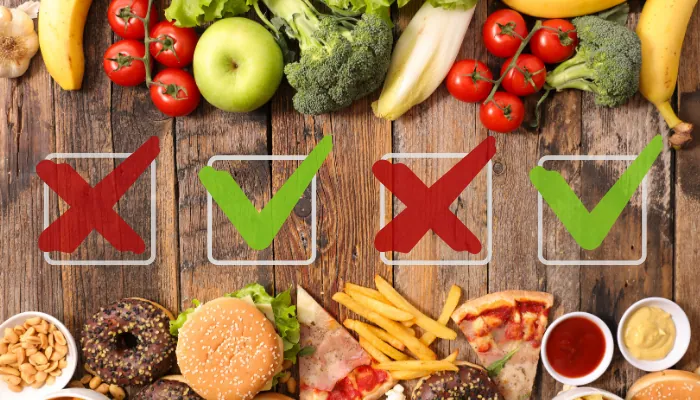For a smooth recovery after dental implant surgery, patients are advised to adhere to the following dietary recommendations. It is crucial to steer clear of any foods that might cause physical disruption or discomfort to the implant.
- The foremost consideration is to avoid skipping meals since obtaining the necessary nutrients is crucial for recuperation and expediting the healing process. In case you have dietary restrictions due to medical conditions such as diabetes, you must adhere to those eating habits or follow the instructions provided by your specialist.
- Start with soft and liquid foods, then gradually transition to solid foods over several days. Staying hydrated is crucial. Although certain physicians may suggest consuming only liquids or pureed foods such as soups, ice cream, puddings, and milkshakes during the first few days, it is not mandatory.
- During the day of the surgery, it is recommended to consume an ample amount of fluids, up to 2 quarts per day, while refraining from hot liquids and hot food as they can exacerbate bleeding and swelling.
- It is also advisable to avoid extremely hot food and abstain from using a straw for the initial days following the surgery.
- Additionally, patients must abstain from consuming any alcoholic beverages and refrain from smoking.
At this stage, ensuring comfort is crucial as eating should not cause discomfort to the patient. Although selecting the appropriate food may differ based on individual preferences, certain guidelines are universally applicable.
Patients in recovery should refrain from chewing food until the sensation in their tongue has returned and also steer clear of food items that might get trapped in the surgical sites, such as popcorn, rice, sunflower seeds, nuts, etc.
What to eat after a dental implant surgery
To ensure a good recovery after a dental implant surgery, it is recommended to eat only soft foods that require minimal chewing. For the first day following the procedure, stick to very soft or liquid foods to avoid accidentally biting your tongue or cheeks due to residual numbness from the anesthesia.
Immediately after surgery, try consuming foods like smoothies, yogurt, ice cream, pudding, applesauce, mashed potatoes, and creamy soups and broths.
Over the following week, you can start incorporating slightly more textured foods into your diet such as macaroni and cheese, pancakes, rice, soft bread, cooked vegetables, eggs, and pasta.
It may take up to 1-2 weeks to introduce tougher, chewy foods like meat and fibrous, raw vegetables, depending on how quickly you recover. During this time, it’s important to avoid chewing on the side of your mouth with the implant for at least 2 weeks.
Below is a list of examples that may aid in selecting appropriate foods:
- Soft fruits, such as bananas, peaches, nectarines, melons, and all types of berries, are typically good choices.
- Avoid hard foods and opt for oatmeal, soft cereals, soft bread, rice, grits, or mashed potatoes.
- Consume plenty of water as staying hydrated is crucial for your immune system and overall health.
- Remember to cut fruits and vegetables into small pieces before consuming them.
- When it comes to vegetables, cooked or steamed options like broccoli, carrots, and squash are preferable.
- Sauces and soups are an excellent option, and softer fruits like bananas, peaches, nectarines, melons, and berries are also suitable.
- Safe sources of protein include eggs, fish, seafood, and beans, as well as dairy products like milk, yogurt, and cheese. Couscous and quinoa are other alternatives, both being wheat and grain-free.

More ideas
Here are additional suggestions for expediting the recovery process:
- Macaroni and cheese, soft bread, and baked or mashed potatoes.
- Scrambled eggs, cottage cheese, and applesauce.
- Finely chopped ground beef, baked or broiled fish, and broiled or stewed chicken.
- Cooked cereals like oatmeal or cream of wheat and yogurt.
- Drinks such as juice, water, milk, coffee, and tea.
- Desserts like puddings, pound cake, milkshakes, and ice cream.
- Homemade broths, bouillon, and soups.
What shouldn’t I eat after a dental implant surgery?
After dental implant surgery, you should avoid hard, crunchy, or chewy foods that can cause discomfort, bleeding, or damage to the implant site. Examples of such foods include popcorn, nuts, seeds, chips, hard candy, and tough meats.
Additionally, you should avoid hot, spicy, or acidic foods and drinks that may irritate the surgical area. It is also important to avoid drinking through a straw or smoking as the suction can dislodge the blood clot and delay healing.
Can I drink coffee after my dental implant surgery?
It is advisable to avoid hot drinks like coffee for a few days following your surgery to prevent affecting the stitches used during the procedure. It is best to confirm this with your dentist. However, iced coffee can be a good alternative for coffee enthusiasts.
Will I have to restrict my diet after my dental implants have healed?
No, after your dental implants have fully healed, they will function like your natural teeth, and you will not have to follow any strict dietary guidelines.
Are there any other precautions to take while eating?
Yes, it is recommended to avoid chewing on the side where the dental implant was placed and to refrain from using straws, which can disrupt the blood clot formed on the surgical site by creating suction in your mouth.




